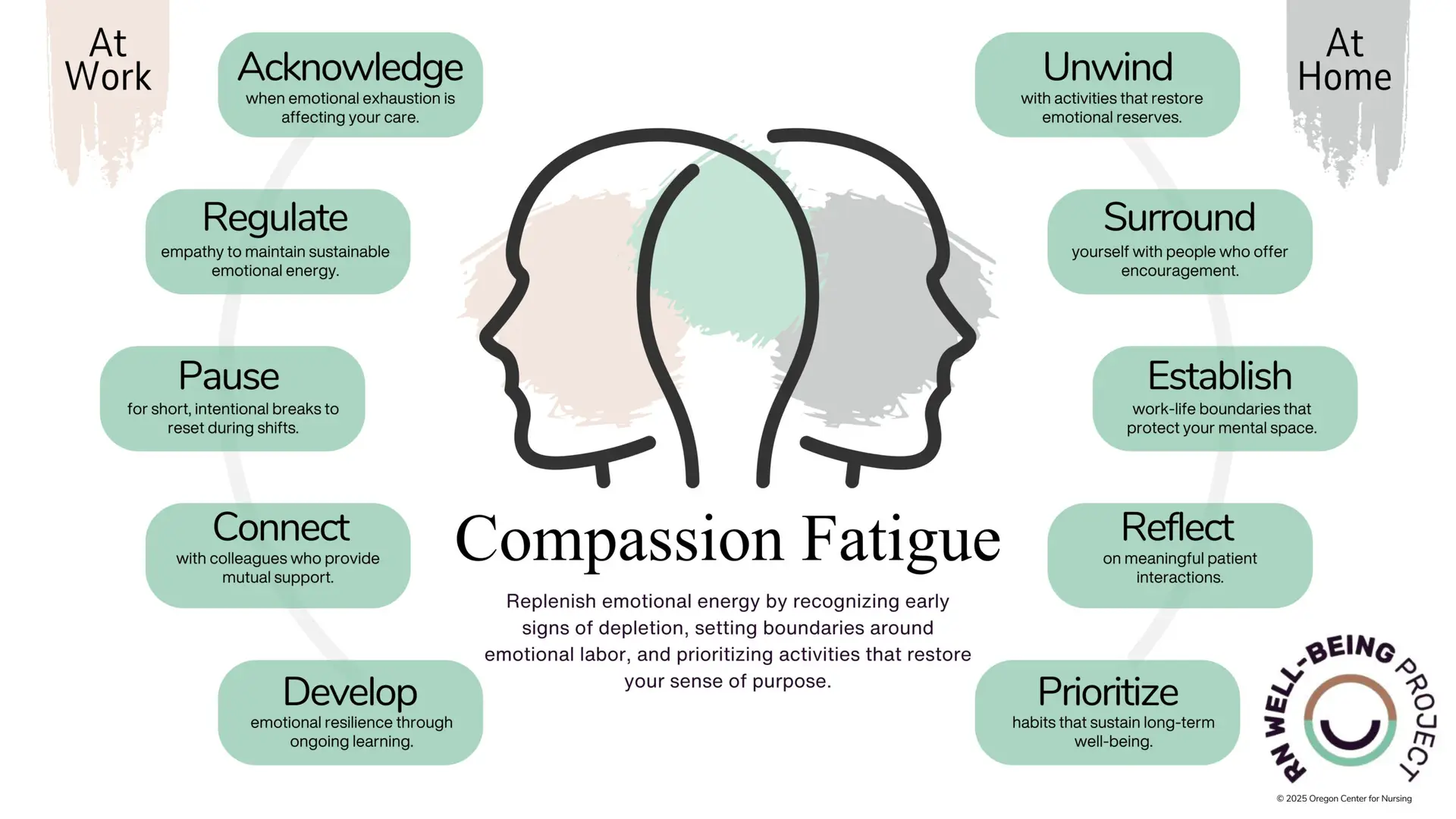Compassion Fatigue: Preventing Emotional Exhaustion
Compassion fatigue is the emotional and physical exhaustion that results from prolonged exposure to others’ suffering. It is different from burnout because it is specifically linked to empathy-based exhaustion, where caring deeply for patients leads to the depletion of emotional resources (1-8).
- You may feel: Emotionally drained, detached from your work, or increasingly irritated. You might avoid patients or feel numb to their suffering (1, 2, 4).
- Why it matters: Compassion fatigue can lead to decreased empathy, poor work performance, and disengagement, making it difficult to provide compassionate care and increasing job dissatisfaction (3, 9).
References
- Marshman, C., & Hansen, A. (2021). Compassion fatigue in mental health nurses: A systematic review. Journal of Psychiatric and Mental Health Nursing, 29(4), 529–543. https://doi.org/10.1111/jpm.12812
- Paiva-Salisbury, M. L., & Schwanz, K. A. (2022). Building Compassion Fatigue Resilience: Awareness, Prevention, and Intervention for Pre-Professionals and Current Practitioners. Journal of Health Service Psychology, 48(1), 39–46. https://doi.org/10.1007/s42843-022-00054-9
- Cavanagh, N., Cockett, G., Heinrich, C., Doig, L., Fiest, K. M., Guichon, J. R., Page, S., Mitchell, I., & Doig, C. (2019). Compassion fatigue in healthcare providers: A systematic review and meta-analysis. Nursing Ethics, 27(3), 639–665. https://doi.org/10.1177/0969733019889400
- Alharbi, J., Jackson, D., & Usher, K. (2019). Compassion fatigue in critical care nurses. Saudi Medical Journal, 40(11), 1087–1097. https://doi.org/10.15537/smj.2019.11.24569
- Roberts, C., Darroch, F., Giles, A. R., & Van Bruggen, R. (2022). You’re carrying so many people’s stories: vicarious trauma among fly-in fly-out mental health service providers in Canada. International Journal of Qualitative Studies on Health and Well-being, 17(1). https://doi.org/10.1080/17482631.2022.2040089
- Stoewen, D. L. (2019a). Moving from compassion fatigue to compassion resilience Part 1: Compassion – A health care priority, core value, and ethical imperative. PubMed, 60(7), 783–784. https://pubmed.ncbi.nlm.nih.gov/31281199
- Stoewen, D. L. (2019b). Moving from compassion fatigue to compassion resilience Part 2: Understanding compassion fatigue. PubMed, 60(9), 1004–1006. https://pubmed.ncbi.nlm.nih.gov/31523091
- Isobel, S., & Thomas, M. (2021). Vicarious trauma and nursing: An integrative review. International Journal of Mental Health Nursing, 31(2), 247–259. https://doi.org/10.1111/inm.12953
- Xie, W., Wang, J., Okoli, C. T., He, H., Feng, F., Zhuang, L., Tang, P., Zeng, L., & Jin, M. (2020). Prevalence and factors of compassion fatigue among Chinese psychiatric nurses. Medicine, 99(29), e21083. https://doi.org/10.1097/md.0000000000021083
Where can Compassion Fatigue occur?
Compassion fatigue can develop in any healthcare setting, but certain environments and situations put nurses at higher risk:
- Constant Exposure to Trauma – Working in emergency rooms, ICUs, oncology, or palliative care means regularly witnessing suffering, loss, and distress—making emotional exhaustion more likely (1-2).
- Caring for Complex Patients – Managing chronic illnesses, mental health conditions, or multifaceted care needs can be mentally and emotionally demanding over time (1-2).
- Forming Close Bonds with Patients – When you invest deeply in your patients and their families, their pain, setbacks, or loss can take a personal toll (1-2).
- High Mortality or Suffering Rates – Environments where patients face prolonged suffering or have low survival rates, like critical care and hospice, can make emotional strain harder to shake (1-2).
- Being New to Healthcare – Early-career nurses and those with less experience often struggle with the emotional demands of patient care, making them more vulnerable (3-4).
- Other Workplace Factors – Long shifts, lack of support, and high-pressure environments can add to the risk (1-2). Recognizing these challenges early can help you take steps to protect your well-being.
- Cavanagh, N., Cockett, G., Heinrich, C., Doig, L., Fiest, K. M., Guichon, J. R., Page, S., Mitchell, I., & Doig, C. (2019). Compassion fatigue in healthcare providers: A systematic review and meta-analysis. Nursing Ethics, 27(3), 639–665. https://doi.org/10.1177/0969733019889400
- Alharbi, J., Jackson, D., & Usher, K. (2019). Compassion fatigue in critical care nurses. Saudi Medical Journal, 40(11), 1087–1097. https://doi.org/10.15537/smj.2019.11.24569
- Marshman, C., & Hansen, A. (2021). Compassion fatigue in mental health nurses: A systematic review. Journal of Psychiatric and Mental Health Nursing, 29(4), 529–543. https://doi.org/10.1111/jpm.12812
- Xie, W., Wang, J., Okoli, C. T., He, H., Feng, F., Zhuang, L., Tang, P., Zeng, L., & Jin, M. (2020). Prevalence and factors of compassion fatigue among Chinese psychiatric nurses. Medicine, 99(29), e21083. https://doi.org/10.1097/md.0000000000021083
How do I manage Compassion Fatigue at work?
Compassion fatigue is a natural response to the emotional demands of nursing, but it doesn’t have to take over. With the right strategies, you can protect your well-being while continuing to provide compassionate care.
- Take Care of Yourself at Work – Small habits like taking real breaks, staying hydrated, and practicing mindfulness can help maintain energy and mental clarity (1-2).
- Recognize the Signs – Regularly check in with yourself for symptoms of compassion fatigue. If you’re feeling emotionally drained or detached, seek support early (2).
- Set Boundaries – Protect your emotional energy by maintaining a healthy work-life balance and setting limits on how much you take on (3-4).
- Find Support – Lean on trusted colleagues, talk openly about shared challenges, and foster a strong workplace support network (1-2).
- Keep Learning – Ongoing education can help build resilience, improve coping skills, and provide a sense of professional growth (3-4).
- Advocate for a Healthy Work Environment – If possible, seek settings that encourage open communication, reasonable workloads, and staff well-being (2).
- Xie, W., Wang, J., Okoli, C. T., He, H., Feng, F., Zhuang, L., Tang, P., Zeng, L., & Jin, M. (2020). Prevalence and factors of compassion fatigue among Chinese psychiatric nurses. Medicine, 99(29), e21083. https://doi.org/10.1097/md.0000000000021083
- Paiva-Salisbury, M. L., & Schwanz, K. A. (2022). Building Compassion Fatigue Resilience: Awareness, Prevention, and Intervention for Pre-Professionals and Current Practitioners. Journal of Health Service Psychology, 48(1), 39–46. https://doi.org/10.1007/s42843-022-00054-9
- Alharbi, J., Jackson, D., & Usher, K. (2019). Compassion fatigue in critical care nurses. Saudi Medical Journal, 40(11), 1087–1097. https://doi.org/10.15537/smj.2019.11.24569
- Marshman, C., & Hansen, A. (2021). Compassion fatigue in mental health nurses: A systematic review. Journal of Psychiatric and Mental Health Nursing, 29(4), 529–543. https://doi.org/10.1111/jpm.12812
How do I manage Compassion Fatigue at home?
What you do outside of work plays a big role in how you manage compassion fatigue. Prioritizing rest, connection, and self-restoration can help you recharge and stay emotionally resilient.
- Take Care of Your Body – Aim for 7-9 hours of sleep, regular movement (like walking, yoga, or strength training), and a balanced diet to support both physical and mental well-being (1-2).
- Practice Mindfulness – Simple habits like deep breathing, meditation, or unplugging before bed can reduce stress and improve focus. Small moments of mindfulness add up (1-2).
- Stay Connected – Spend time with people who support and understand you. Whether it’s family, friends, or colleagues, strong relationships help protect against emotional exhaustion (1).
Taking intentional steps to care for yourself outside of work makes it easier to show up for your patients—and yourself.
- Xie, W., Wang, J., Okoli, C. T., He, H., Feng, F., Zhuang, L., Tang, P., Zeng, L., & Jin, M. (2020). Prevalence and factors of compassion fatigue among Chinese psychiatric nurses. Medicine, 99(29), e21083. https://doi.org/10.1097/md.0000000000021083
- Paiva-Salisbury, M. L., & Schwanz, K. A. (2022). Building Compassion Fatigue Resilience: Awareness, Prevention, and Intervention for Pre-Professionals and Current Practitioners. Journal of Health Service Psychology, 48(1), 39–46. https://doi.org/10.1007/s42843-022-00054-9
How can I grow through Compassion Satisfaction?
While nursing is emotionally demanding, it can also be deeply rewarding. Compassion satisfaction is the sense of fulfillment that comes from knowing your care makes a difference. Recognizing and nurturing this feeling can help balance the emotional strain of caregiving and sustain long-term well-being (1).
- Recognize What Fulfills You: Reflect on the aspects of patient care that bring you the most meaning—whether it’s comforting families, advocating for patients, or mastering a clinical skill. Small moments of impact add up.
- Develop Emotional Awareness: Strengthening emotional intelligence can help you manage workplace challenges more effectively and reinforce your connection to the meaningful parts of your work. Training in trauma-informed care or resilience-building can be valuable.
- Engage in Professional Growth: Expanding your skills through education, mentorship, or certifications can increase confidence and job satisfaction. If your workplace offers learning opportunities, take advantage of them.
- Foster a Supportive Work Culture: Acknowledge colleagues’ hard work, participate in team-building activities, and contribute to open conversations about workplace well-being. Advocacy doesn’t have to start at the top—small shifts in culture often begin with individuals.
- Encourage Leadership Support: If recognition programs, debriefing sessions, or wellness initiatives exist, take part. If they don’t, consider raising the need for these supports with management. A positive work environment benefits everyone.
- Maintain Work-Life Balance: Work policies that support flexible scheduling and adequate time off exist in some settings—explore your options and advocate for changes that support well-being if needed.
Compassion satisfaction isn’t just about feeling good—it’s about creating a sustainable career in nursing. By recognizing what fuels your sense of purpose and engaging with workplace supports, you can build resilience and continue to find meaning in your work.
Bae, J., Jennings, P. F., Hardeman, C. P., Kim, E., Lee, M., Littleton, T., & Saasa, S. (2020). Compassion Satisfaction Among Social Work Practitioners: The Role of Work-Life Balance. Journal of Social Service Research, 46(3), 320–330. https://doi.org/10.1080/01488376.2019.1566195
Compassion fatigue can slowly deplete emotional energy, making it harder to connect with patients and find meaning in your work. While caregiving is inherently demanding, no one is meant to give endlessly without replenishing themselves. Small, intentional acts of replenishment and professional support can help sustain your ability to provide compassionate, high-quality care while maintaining personal fulfillment.


